Analysing Organisational Behaviour Concepts in Business - Ryanair
VerifiedAdded on 2023/01/19
|17
|5445
|59
Report
AI Summary
This report evaluates the influence of organisational culture, power, and politics on individual and team behaviour within Ryanair, an Irish budget airline. It examines the impact of organisational culture using Handy's model, analysing role, power, person, and task cultures. The report also discusses reward, legitimate, referent, and expert power and their effects on employee motivation and performance. Furthermore, it explores the role of organisational politics, both positive and negative, on productivity and employee relations. The report also delves into content and process theories of motivation and techniques for achieving organisational goals, and evaluates the characteristics of effective versus ineffective teams. Finally, it applies organisational behaviour concepts and philosophies within Ryanair's context.
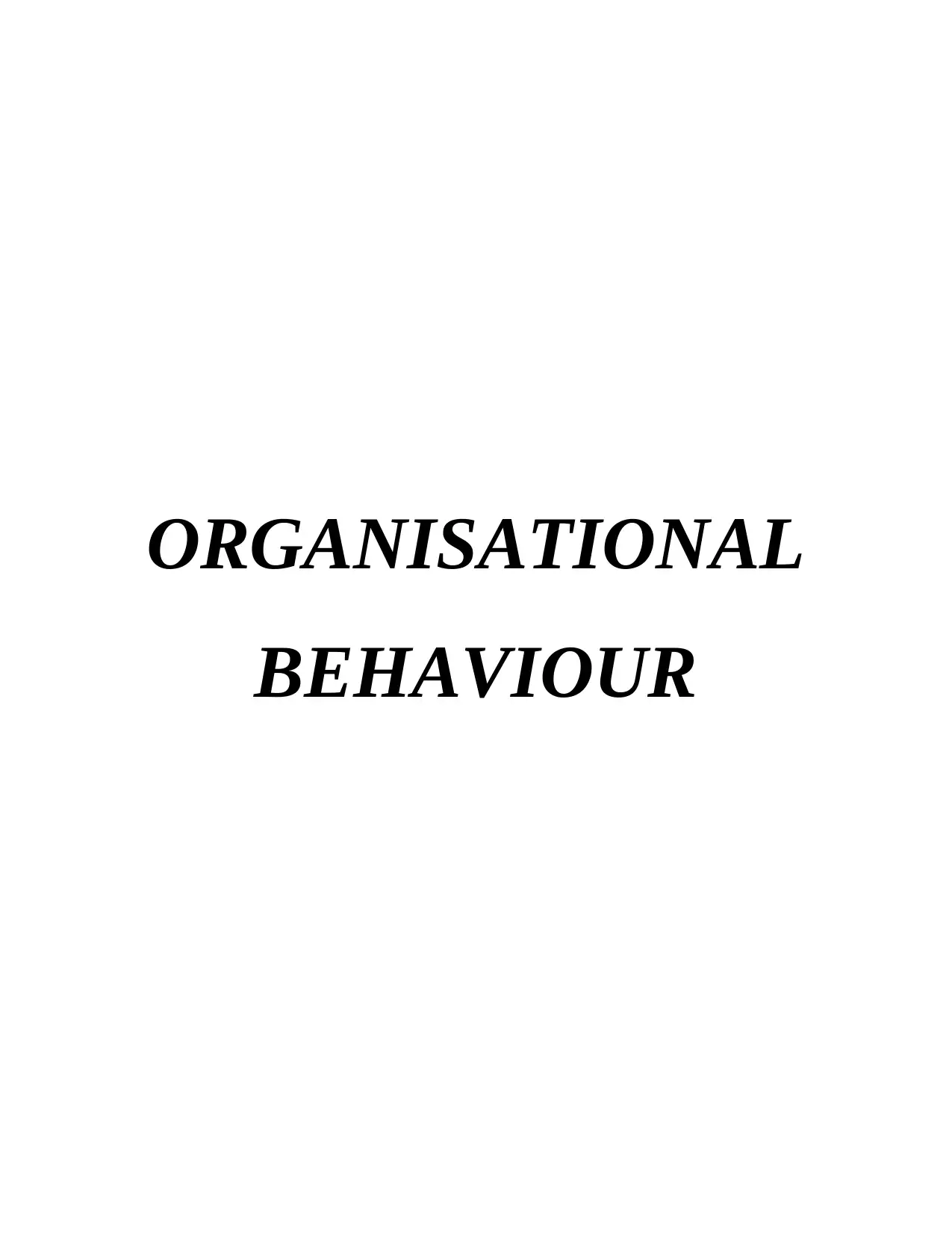
ORGANISATIONAL
BEHAVIOUR
BEHAVIOUR
Paraphrase This Document
Need a fresh take? Get an instant paraphrase of this document with our AI Paraphraser
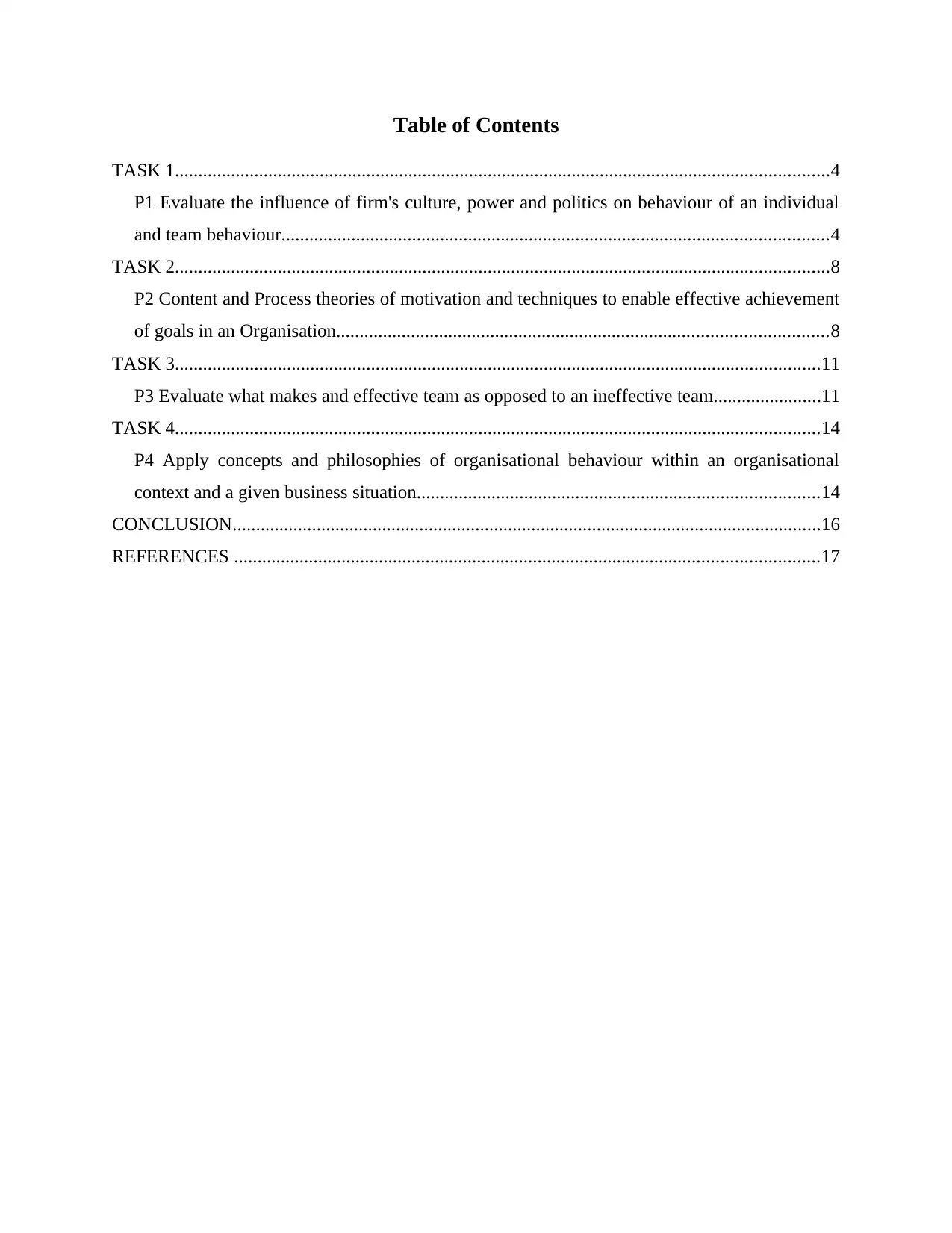
Table of Contents
TASK 1............................................................................................................................................4
P1 Evaluate the influence of firm's culture, power and politics on behaviour of an individual
and team behaviour.....................................................................................................................4
TASK 2............................................................................................................................................8
P2 Content and Process theories of motivation and techniques to enable effective achievement
of goals in an Organisation.........................................................................................................8
TASK 3..........................................................................................................................................11
P3 Evaluate what makes and effective team as opposed to an ineffective team.......................11
TASK 4..........................................................................................................................................14
P4 Apply concepts and philosophies of organisational behaviour within an organisational
context and a given business situation......................................................................................14
CONCLUSION..............................................................................................................................16
REFERENCES .............................................................................................................................17
TASK 1............................................................................................................................................4
P1 Evaluate the influence of firm's culture, power and politics on behaviour of an individual
and team behaviour.....................................................................................................................4
TASK 2............................................................................................................................................8
P2 Content and Process theories of motivation and techniques to enable effective achievement
of goals in an Organisation.........................................................................................................8
TASK 3..........................................................................................................................................11
P3 Evaluate what makes and effective team as opposed to an ineffective team.......................11
TASK 4..........................................................................................................................................14
P4 Apply concepts and philosophies of organisational behaviour within an organisational
context and a given business situation......................................................................................14
CONCLUSION..............................................................................................................................16
REFERENCES .............................................................................................................................17

⊘ This is a preview!⊘
Do you want full access?
Subscribe today to unlock all pages.

Trusted by 1+ million students worldwide
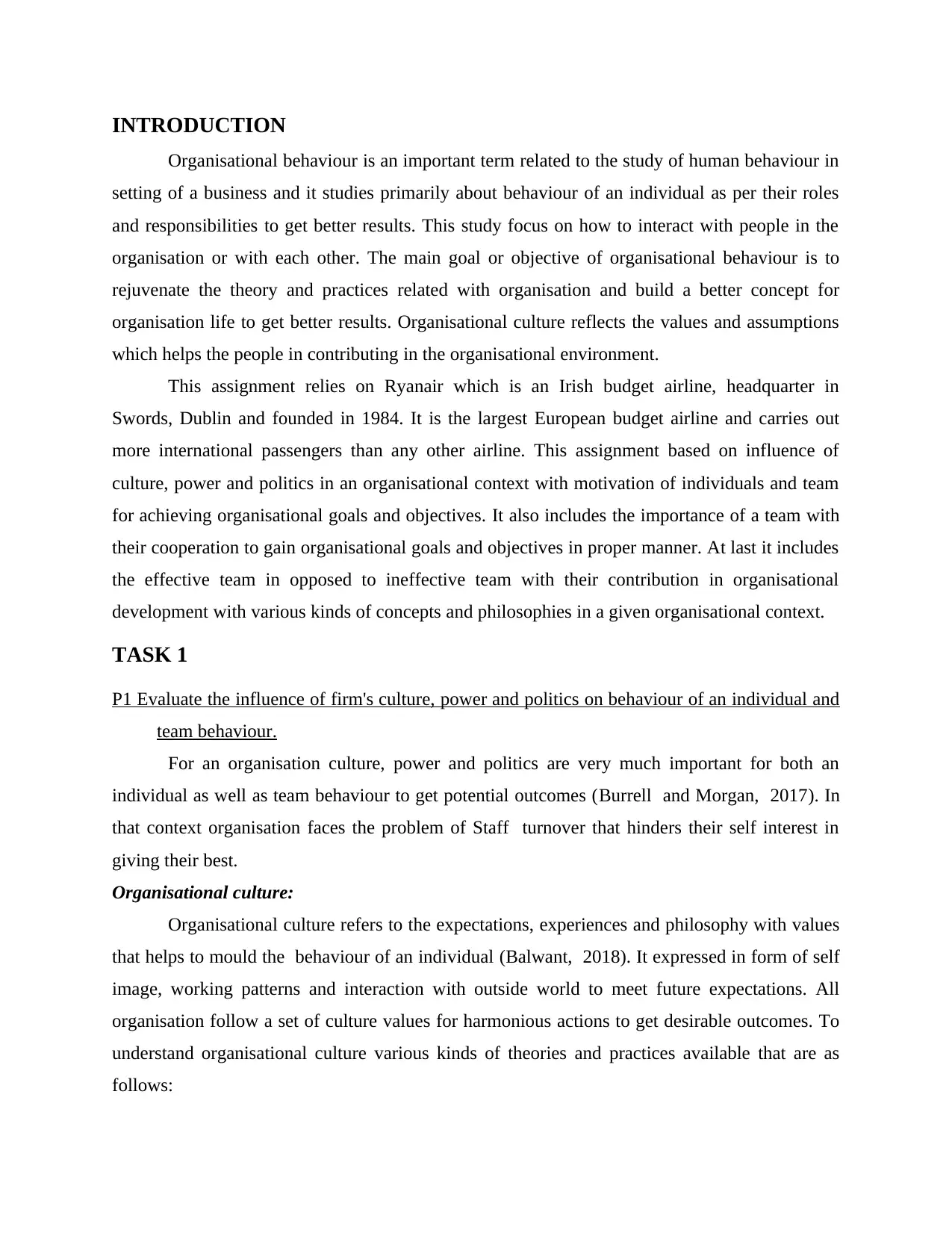
INTRODUCTION
Organisational behaviour is an important term related to the study of human behaviour in
setting of a business and it studies primarily about behaviour of an individual as per their roles
and responsibilities to get better results. This study focus on how to interact with people in the
organisation or with each other. The main goal or objective of organisational behaviour is to
rejuvenate the theory and practices related with organisation and build a better concept for
organisation life to get better results. Organisational culture reflects the values and assumptions
which helps the people in contributing in the organisational environment.
This assignment relies on Ryanair which is an Irish budget airline, headquarter in
Swords, Dublin and founded in 1984. It is the largest European budget airline and carries out
more international passengers than any other airline. This assignment based on influence of
culture, power and politics in an organisational context with motivation of individuals and team
for achieving organisational goals and objectives. It also includes the importance of a team with
their cooperation to gain organisational goals and objectives in proper manner. At last it includes
the effective team in opposed to ineffective team with their contribution in organisational
development with various kinds of concepts and philosophies in a given organisational context.
TASK 1
P1 Evaluate the influence of firm's culture, power and politics on behaviour of an individual and
team behaviour.
For an organisation culture, power and politics are very much important for both an
individual as well as team behaviour to get potential outcomes (Burrell and Morgan, 2017). In
that context organisation faces the problem of Staff turnover that hinders their self interest in
giving their best.
Organisational culture:
Organisational culture refers to the expectations, experiences and philosophy with values
that helps to mould the behaviour of an individual (Balwant, 2018). It expressed in form of self
image, working patterns and interaction with outside world to meet future expectations. All
organisation follow a set of culture values for harmonious actions to get desirable outcomes. To
understand organisational culture various kinds of theories and practices available that are as
follows:
Organisational behaviour is an important term related to the study of human behaviour in
setting of a business and it studies primarily about behaviour of an individual as per their roles
and responsibilities to get better results. This study focus on how to interact with people in the
organisation or with each other. The main goal or objective of organisational behaviour is to
rejuvenate the theory and practices related with organisation and build a better concept for
organisation life to get better results. Organisational culture reflects the values and assumptions
which helps the people in contributing in the organisational environment.
This assignment relies on Ryanair which is an Irish budget airline, headquarter in
Swords, Dublin and founded in 1984. It is the largest European budget airline and carries out
more international passengers than any other airline. This assignment based on influence of
culture, power and politics in an organisational context with motivation of individuals and team
for achieving organisational goals and objectives. It also includes the importance of a team with
their cooperation to gain organisational goals and objectives in proper manner. At last it includes
the effective team in opposed to ineffective team with their contribution in organisational
development with various kinds of concepts and philosophies in a given organisational context.
TASK 1
P1 Evaluate the influence of firm's culture, power and politics on behaviour of an individual and
team behaviour.
For an organisation culture, power and politics are very much important for both an
individual as well as team behaviour to get potential outcomes (Burrell and Morgan, 2017). In
that context organisation faces the problem of Staff turnover that hinders their self interest in
giving their best.
Organisational culture:
Organisational culture refers to the expectations, experiences and philosophy with values
that helps to mould the behaviour of an individual (Balwant, 2018). It expressed in form of self
image, working patterns and interaction with outside world to meet future expectations. All
organisation follow a set of culture values for harmonious actions to get desirable outcomes. To
understand organisational culture various kinds of theories and practices available that are as
follows:
Paraphrase This Document
Need a fresh take? Get an instant paraphrase of this document with our AI Paraphraser
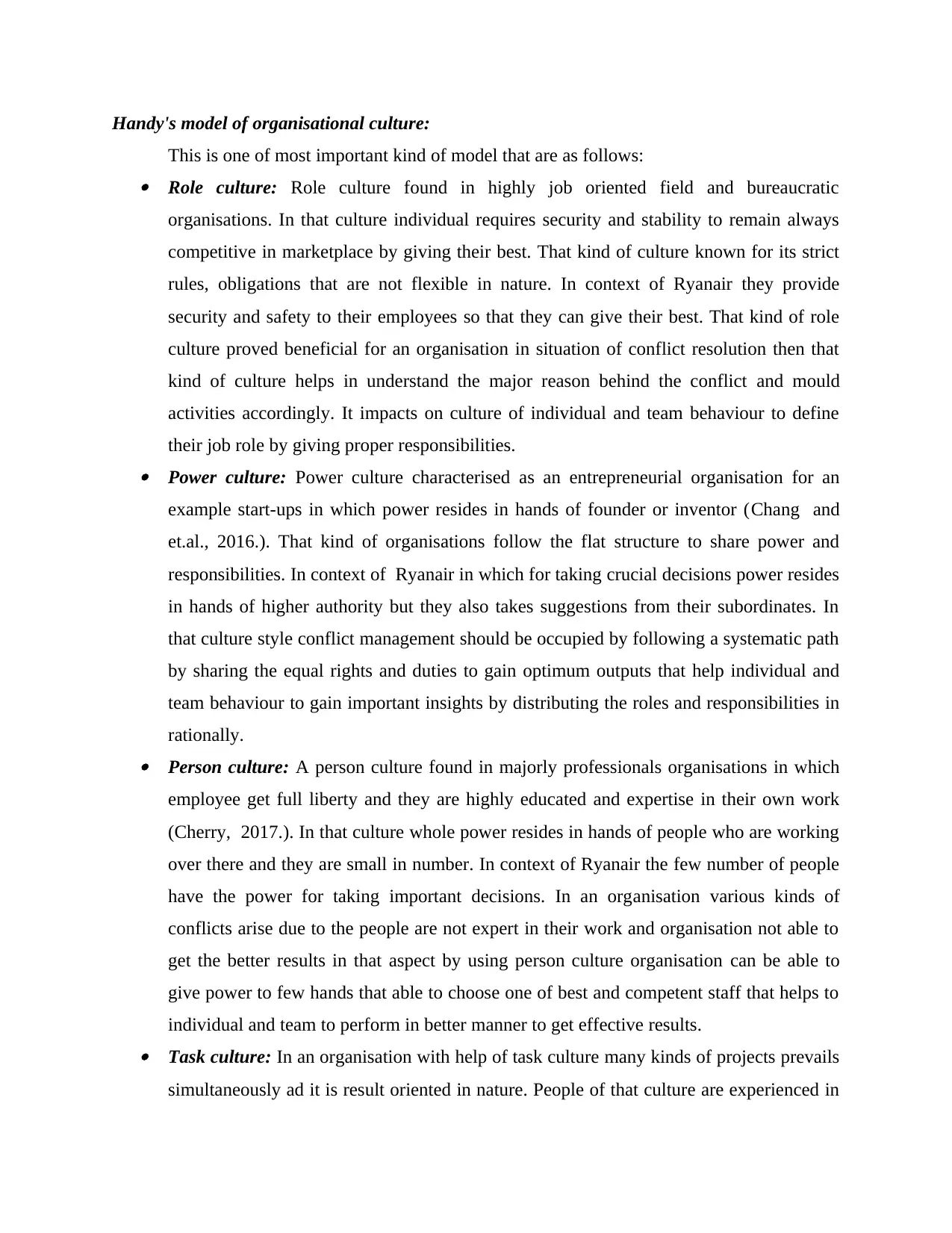
Handy's model of organisational culture:
This is one of most important kind of model that are as follows: Role culture: Role culture found in highly job oriented field and bureaucratic
organisations. In that culture individual requires security and stability to remain always
competitive in marketplace by giving their best. That kind of culture known for its strict
rules, obligations that are not flexible in nature. In context of Ryanair they provide
security and safety to their employees so that they can give their best. That kind of role
culture proved beneficial for an organisation in situation of conflict resolution then that
kind of culture helps in understand the major reason behind the conflict and mould
activities accordingly. It impacts on culture of individual and team behaviour to define
their job role by giving proper responsibilities. Power culture: Power culture characterised as an entrepreneurial organisation for an
example start-ups in which power resides in hands of founder or inventor (Chang and
et.al., 2016.). That kind of organisations follow the flat structure to share power and
responsibilities. In context of Ryanair in which for taking crucial decisions power resides
in hands of higher authority but they also takes suggestions from their subordinates. In
that culture style conflict management should be occupied by following a systematic path
by sharing the equal rights and duties to gain optimum outputs that help individual and
team behaviour to gain important insights by distributing the roles and responsibilities in
rationally. Person culture: A person culture found in majorly professionals organisations in which
employee get full liberty and they are highly educated and expertise in their own work
(Cherry, 2017.). In that culture whole power resides in hands of people who are working
over there and they are small in number. In context of Ryanair the few number of people
have the power for taking important decisions. In an organisation various kinds of
conflicts arise due to the people are not expert in their work and organisation not able to
get the better results in that aspect by using person culture organisation can be able to
give power to few hands that able to choose one of best and competent staff that helps to
individual and team to perform in better manner to get effective results. Task culture: In an organisation with help of task culture many kinds of projects prevails
simultaneously ad it is result oriented in nature. People of that culture are experienced in
This is one of most important kind of model that are as follows: Role culture: Role culture found in highly job oriented field and bureaucratic
organisations. In that culture individual requires security and stability to remain always
competitive in marketplace by giving their best. That kind of culture known for its strict
rules, obligations that are not flexible in nature. In context of Ryanair they provide
security and safety to their employees so that they can give their best. That kind of role
culture proved beneficial for an organisation in situation of conflict resolution then that
kind of culture helps in understand the major reason behind the conflict and mould
activities accordingly. It impacts on culture of individual and team behaviour to define
their job role by giving proper responsibilities. Power culture: Power culture characterised as an entrepreneurial organisation for an
example start-ups in which power resides in hands of founder or inventor (Chang and
et.al., 2016.). That kind of organisations follow the flat structure to share power and
responsibilities. In context of Ryanair in which for taking crucial decisions power resides
in hands of higher authority but they also takes suggestions from their subordinates. In
that culture style conflict management should be occupied by following a systematic path
by sharing the equal rights and duties to gain optimum outputs that help individual and
team behaviour to gain important insights by distributing the roles and responsibilities in
rationally. Person culture: A person culture found in majorly professionals organisations in which
employee get full liberty and they are highly educated and expertise in their own work
(Cherry, 2017.). In that culture whole power resides in hands of people who are working
over there and they are small in number. In context of Ryanair the few number of people
have the power for taking important decisions. In an organisation various kinds of
conflicts arise due to the people are not expert in their work and organisation not able to
get the better results in that aspect by using person culture organisation can be able to
give power to few hands that able to choose one of best and competent staff that helps to
individual and team to perform in better manner to get effective results. Task culture: In an organisation with help of task culture many kinds of projects prevails
simultaneously ad it is result oriented in nature. People of that culture are experienced in
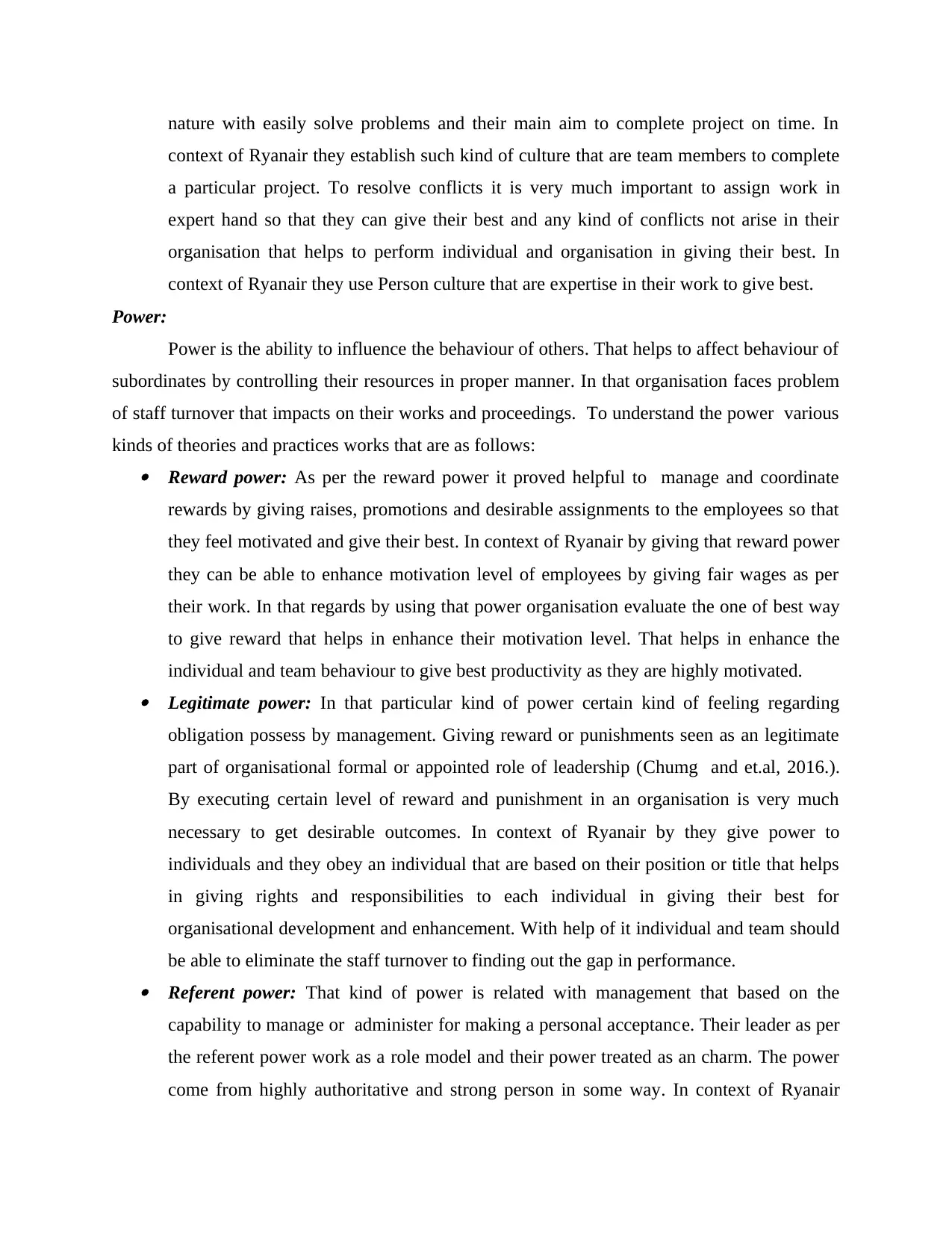
nature with easily solve problems and their main aim to complete project on time. In
context of Ryanair they establish such kind of culture that are team members to complete
a particular project. To resolve conflicts it is very much important to assign work in
expert hand so that they can give their best and any kind of conflicts not arise in their
organisation that helps to perform individual and organisation in giving their best. In
context of Ryanair they use Person culture that are expertise in their work to give best.
Power:
Power is the ability to influence the behaviour of others. That helps to affect behaviour of
subordinates by controlling their resources in proper manner. In that organisation faces problem
of staff turnover that impacts on their works and proceedings. To understand the power various
kinds of theories and practices works that are as follows: Reward power: As per the reward power it proved helpful to manage and coordinate
rewards by giving raises, promotions and desirable assignments to the employees so that
they feel motivated and give their best. In context of Ryanair by giving that reward power
they can be able to enhance motivation level of employees by giving fair wages as per
their work. In that regards by using that power organisation evaluate the one of best way
to give reward that helps in enhance their motivation level. That helps in enhance the
individual and team behaviour to give best productivity as they are highly motivated. Legitimate power: In that particular kind of power certain kind of feeling regarding
obligation possess by management. Giving reward or punishments seen as an legitimate
part of organisational formal or appointed role of leadership (Chumg and et.al, 2016.).
By executing certain level of reward and punishment in an organisation is very much
necessary to get desirable outcomes. In context of Ryanair by they give power to
individuals and they obey an individual that are based on their position or title that helps
in giving rights and responsibilities to each individual in giving their best for
organisational development and enhancement. With help of it individual and team should
be able to eliminate the staff turnover to finding out the gap in performance. Referent power: That kind of power is related with management that based on the
capability to manage or administer for making a personal acceptance. Their leader as per
the referent power work as a role model and their power treated as an charm. The power
come from highly authoritative and strong person in some way. In context of Ryanair
context of Ryanair they establish such kind of culture that are team members to complete
a particular project. To resolve conflicts it is very much important to assign work in
expert hand so that they can give their best and any kind of conflicts not arise in their
organisation that helps to perform individual and organisation in giving their best. In
context of Ryanair they use Person culture that are expertise in their work to give best.
Power:
Power is the ability to influence the behaviour of others. That helps to affect behaviour of
subordinates by controlling their resources in proper manner. In that organisation faces problem
of staff turnover that impacts on their works and proceedings. To understand the power various
kinds of theories and practices works that are as follows: Reward power: As per the reward power it proved helpful to manage and coordinate
rewards by giving raises, promotions and desirable assignments to the employees so that
they feel motivated and give their best. In context of Ryanair by giving that reward power
they can be able to enhance motivation level of employees by giving fair wages as per
their work. In that regards by using that power organisation evaluate the one of best way
to give reward that helps in enhance their motivation level. That helps in enhance the
individual and team behaviour to give best productivity as they are highly motivated. Legitimate power: In that particular kind of power certain kind of feeling regarding
obligation possess by management. Giving reward or punishments seen as an legitimate
part of organisational formal or appointed role of leadership (Chumg and et.al, 2016.).
By executing certain level of reward and punishment in an organisation is very much
necessary to get desirable outcomes. In context of Ryanair by they give power to
individuals and they obey an individual that are based on their position or title that helps
in giving rights and responsibilities to each individual in giving their best for
organisational development and enhancement. With help of it individual and team should
be able to eliminate the staff turnover to finding out the gap in performance. Referent power: That kind of power is related with management that based on the
capability to manage or administer for making a personal acceptance. Their leader as per
the referent power work as a role model and their power treated as an charm. The power
come from highly authoritative and strong person in some way. In context of Ryanair
⊘ This is a preview!⊘
Do you want full access?
Subscribe today to unlock all pages.

Trusted by 1+ million students worldwide
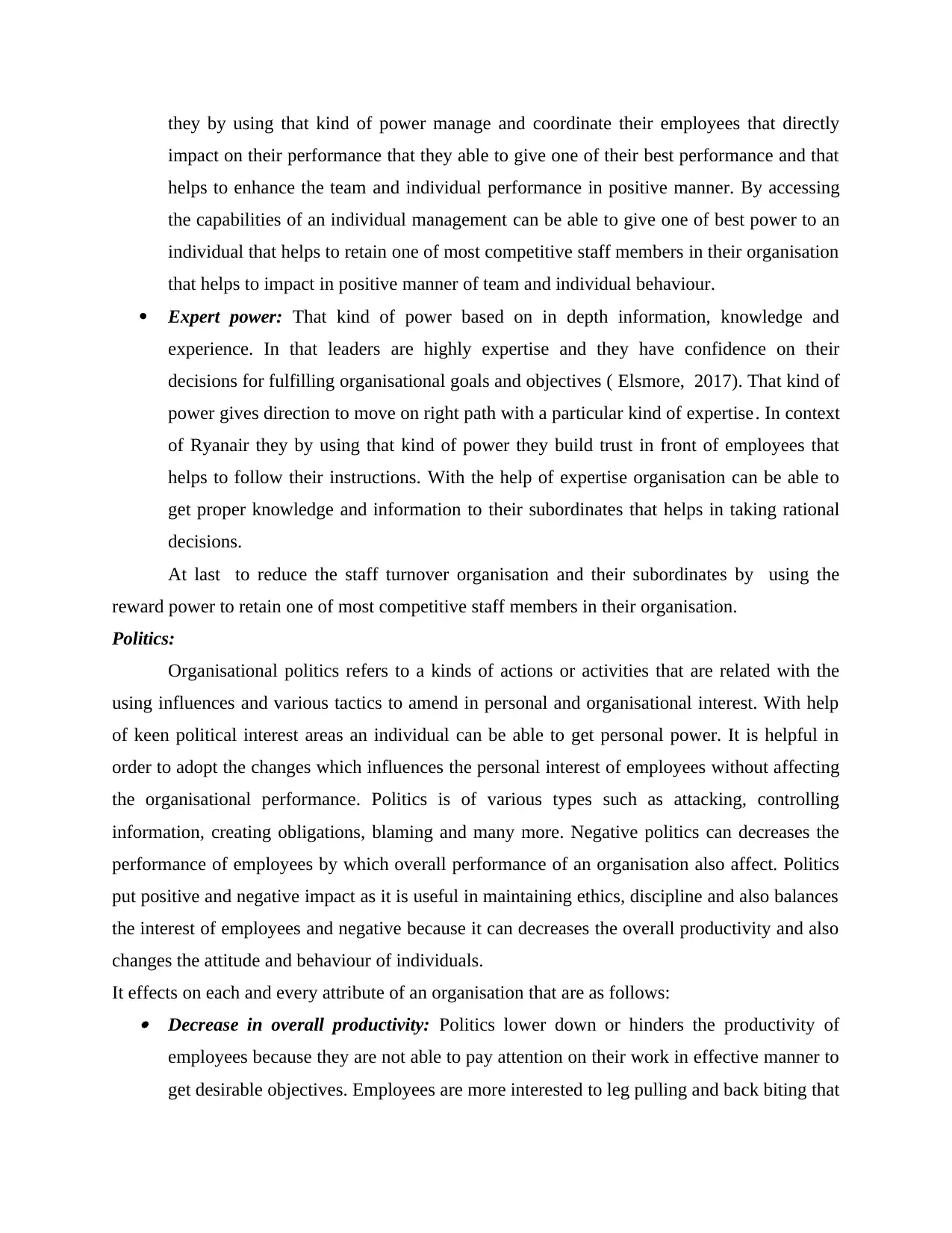
they by using that kind of power manage and coordinate their employees that directly
impact on their performance that they able to give one of their best performance and that
helps to enhance the team and individual performance in positive manner. By accessing
the capabilities of an individual management can be able to give one of best power to an
individual that helps to retain one of most competitive staff members in their organisation
that helps to impact in positive manner of team and individual behaviour.
Expert power: That kind of power based on in depth information, knowledge and
experience. In that leaders are highly expertise and they have confidence on their
decisions for fulfilling organisational goals and objectives ( Elsmore, 2017). That kind of
power gives direction to move on right path with a particular kind of expertise. In context
of Ryanair they by using that kind of power they build trust in front of employees that
helps to follow their instructions. With the help of expertise organisation can be able to
get proper knowledge and information to their subordinates that helps in taking rational
decisions.
At last to reduce the staff turnover organisation and their subordinates by using the
reward power to retain one of most competitive staff members in their organisation.
Politics:
Organisational politics refers to a kinds of actions or activities that are related with the
using influences and various tactics to amend in personal and organisational interest. With help
of keen political interest areas an individual can be able to get personal power. It is helpful in
order to adopt the changes which influences the personal interest of employees without affecting
the organisational performance. Politics is of various types such as attacking, controlling
information, creating obligations, blaming and many more. Negative politics can decreases the
performance of employees by which overall performance of an organisation also affect. Politics
put positive and negative impact as it is useful in maintaining ethics, discipline and also balances
the interest of employees and negative because it can decreases the overall productivity and also
changes the attitude and behaviour of individuals.
It effects on each and every attribute of an organisation that are as follows: Decrease in overall productivity: Politics lower down or hinders the productivity of
employees because they are not able to pay attention on their work in effective manner to
get desirable objectives. Employees are more interested to leg pulling and back biting that
impact on their performance that they able to give one of their best performance and that
helps to enhance the team and individual performance in positive manner. By accessing
the capabilities of an individual management can be able to give one of best power to an
individual that helps to retain one of most competitive staff members in their organisation
that helps to impact in positive manner of team and individual behaviour.
Expert power: That kind of power based on in depth information, knowledge and
experience. In that leaders are highly expertise and they have confidence on their
decisions for fulfilling organisational goals and objectives ( Elsmore, 2017). That kind of
power gives direction to move on right path with a particular kind of expertise. In context
of Ryanair they by using that kind of power they build trust in front of employees that
helps to follow their instructions. With the help of expertise organisation can be able to
get proper knowledge and information to their subordinates that helps in taking rational
decisions.
At last to reduce the staff turnover organisation and their subordinates by using the
reward power to retain one of most competitive staff members in their organisation.
Politics:
Organisational politics refers to a kinds of actions or activities that are related with the
using influences and various tactics to amend in personal and organisational interest. With help
of keen political interest areas an individual can be able to get personal power. It is helpful in
order to adopt the changes which influences the personal interest of employees without affecting
the organisational performance. Politics is of various types such as attacking, controlling
information, creating obligations, blaming and many more. Negative politics can decreases the
performance of employees by which overall performance of an organisation also affect. Politics
put positive and negative impact as it is useful in maintaining ethics, discipline and also balances
the interest of employees and negative because it can decreases the overall productivity and also
changes the attitude and behaviour of individuals.
It effects on each and every attribute of an organisation that are as follows: Decrease in overall productivity: Politics lower down or hinders the productivity of
employees because they are not able to pay attention on their work in effective manner to
get desirable objectives. Employees are more interested to leg pulling and back biting that
Paraphrase This Document
Need a fresh take? Get an instant paraphrase of this document with our AI Paraphraser
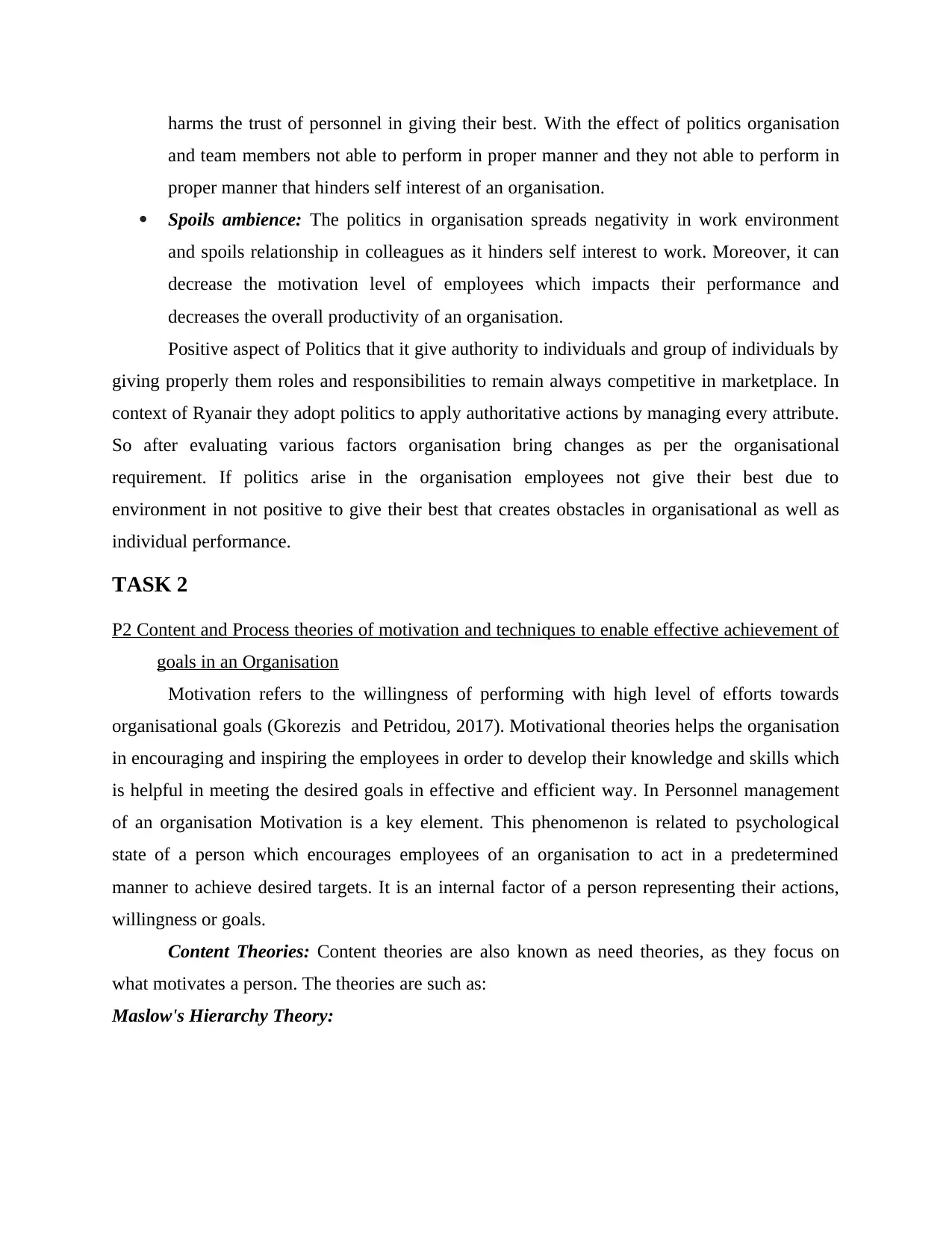
harms the trust of personnel in giving their best. With the effect of politics organisation
and team members not able to perform in proper manner and they not able to perform in
proper manner that hinders self interest of an organisation.
Spoils ambience: The politics in organisation spreads negativity in work environment
and spoils relationship in colleagues as it hinders self interest to work. Moreover, it can
decrease the motivation level of employees which impacts their performance and
decreases the overall productivity of an organisation.
Positive aspect of Politics that it give authority to individuals and group of individuals by
giving properly them roles and responsibilities to remain always competitive in marketplace. In
context of Ryanair they adopt politics to apply authoritative actions by managing every attribute.
So after evaluating various factors organisation bring changes as per the organisational
requirement. If politics arise in the organisation employees not give their best due to
environment in not positive to give their best that creates obstacles in organisational as well as
individual performance.
TASK 2
P2 Content and Process theories of motivation and techniques to enable effective achievement of
goals in an Organisation
Motivation refers to the willingness of performing with high level of efforts towards
organisational goals (Gkorezis and Petridou, 2017). Motivational theories helps the organisation
in encouraging and inspiring the employees in order to develop their knowledge and skills which
is helpful in meeting the desired goals in effective and efficient way. In Personnel management
of an organisation Motivation is a key element. This phenomenon is related to psychological
state of a person which encourages employees of an organisation to act in a predetermined
manner to achieve desired targets. It is an internal factor of a person representing their actions,
willingness or goals.
Content Theories: Content theories are also known as need theories, as they focus on
what motivates a person. The theories are such as:
Maslow's Hierarchy Theory:
and team members not able to perform in proper manner and they not able to perform in
proper manner that hinders self interest of an organisation.
Spoils ambience: The politics in organisation spreads negativity in work environment
and spoils relationship in colleagues as it hinders self interest to work. Moreover, it can
decrease the motivation level of employees which impacts their performance and
decreases the overall productivity of an organisation.
Positive aspect of Politics that it give authority to individuals and group of individuals by
giving properly them roles and responsibilities to remain always competitive in marketplace. In
context of Ryanair they adopt politics to apply authoritative actions by managing every attribute.
So after evaluating various factors organisation bring changes as per the organisational
requirement. If politics arise in the organisation employees not give their best due to
environment in not positive to give their best that creates obstacles in organisational as well as
individual performance.
TASK 2
P2 Content and Process theories of motivation and techniques to enable effective achievement of
goals in an Organisation
Motivation refers to the willingness of performing with high level of efforts towards
organisational goals (Gkorezis and Petridou, 2017). Motivational theories helps the organisation
in encouraging and inspiring the employees in order to develop their knowledge and skills which
is helpful in meeting the desired goals in effective and efficient way. In Personnel management
of an organisation Motivation is a key element. This phenomenon is related to psychological
state of a person which encourages employees of an organisation to act in a predetermined
manner to achieve desired targets. It is an internal factor of a person representing their actions,
willingness or goals.
Content Theories: Content theories are also known as need theories, as they focus on
what motivates a person. The theories are such as:
Maslow's Hierarchy Theory:
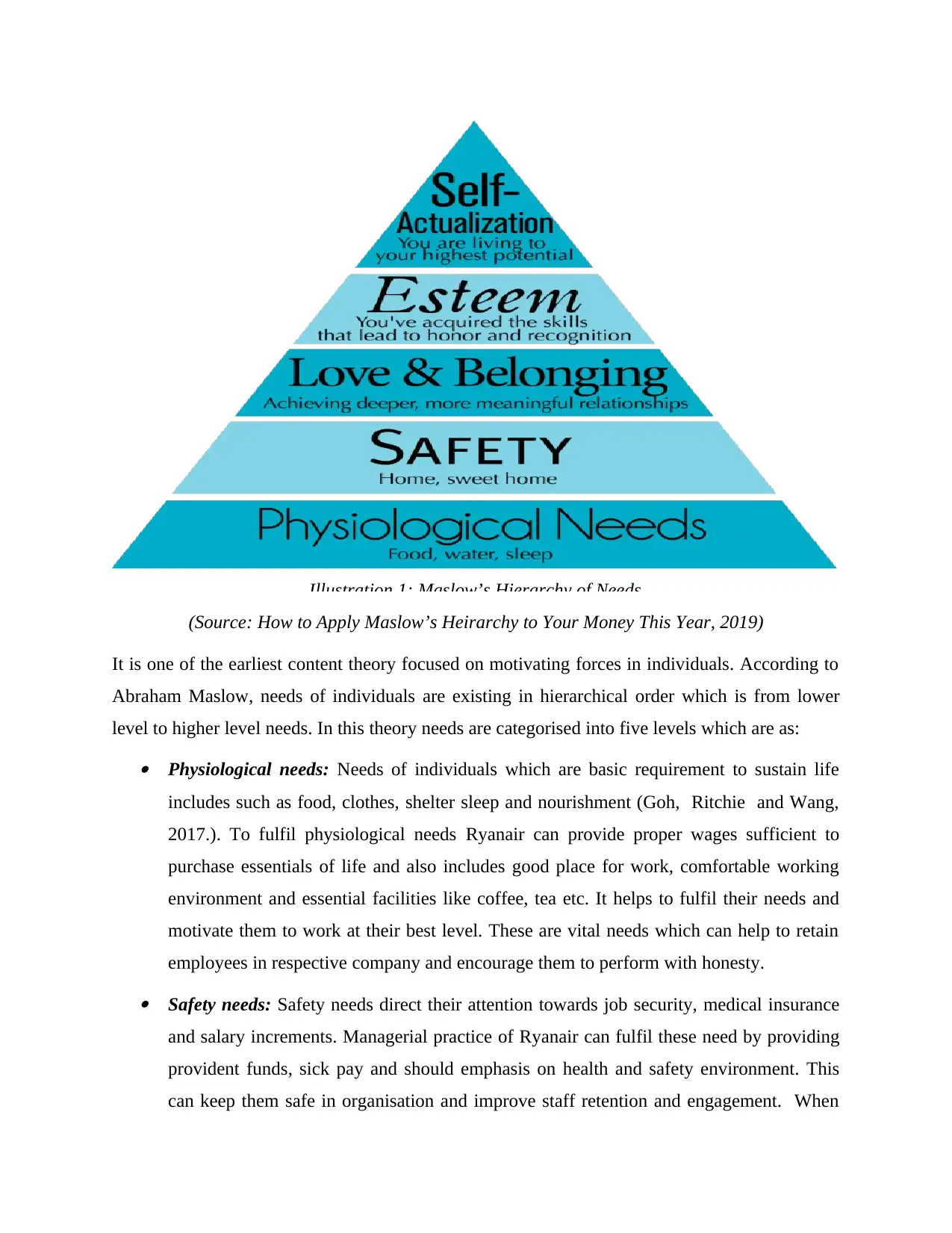
Illustration 1: Maslow’s Hierarchy of Needs
(Source: How to Apply Maslow’s Heirarchy to Your Money This Year, 2019)
It is one of the earliest content theory focused on motivating forces in individuals. According to
Abraham Maslow, needs of individuals are existing in hierarchical order which is from lower
level to higher level needs. In this theory needs are categorised into five levels which are as: Physiological needs: Needs of individuals which are basic requirement to sustain life
includes such as food, clothes, shelter sleep and nourishment (Goh, Ritchie and Wang,
2017.). To fulfil physiological needs Ryanair can provide proper wages sufficient to
purchase essentials of life and also includes good place for work, comfortable working
environment and essential facilities like coffee, tea etc. It helps to fulfil their needs and
motivate them to work at their best level. These are vital needs which can help to retain
employees in respective company and encourage them to perform with honesty. Safety needs: Safety needs direct their attention towards job security, medical insurance
and salary increments. Managerial practice of Ryanair can fulfil these need by providing
provident funds, sick pay and should emphasis on health and safety environment. This
can keep them safe in organisation and improve staff retention and engagement. When
(Source: How to Apply Maslow’s Heirarchy to Your Money This Year, 2019)
It is one of the earliest content theory focused on motivating forces in individuals. According to
Abraham Maslow, needs of individuals are existing in hierarchical order which is from lower
level to higher level needs. In this theory needs are categorised into five levels which are as: Physiological needs: Needs of individuals which are basic requirement to sustain life
includes such as food, clothes, shelter sleep and nourishment (Goh, Ritchie and Wang,
2017.). To fulfil physiological needs Ryanair can provide proper wages sufficient to
purchase essentials of life and also includes good place for work, comfortable working
environment and essential facilities like coffee, tea etc. It helps to fulfil their needs and
motivate them to work at their best level. These are vital needs which can help to retain
employees in respective company and encourage them to perform with honesty. Safety needs: Safety needs direct their attention towards job security, medical insurance
and salary increments. Managerial practice of Ryanair can fulfil these need by providing
provident funds, sick pay and should emphasis on health and safety environment. This
can keep them safe in organisation and improve staff retention and engagement. When
⊘ This is a preview!⊘
Do you want full access?
Subscribe today to unlock all pages.

Trusted by 1+ million students worldwide
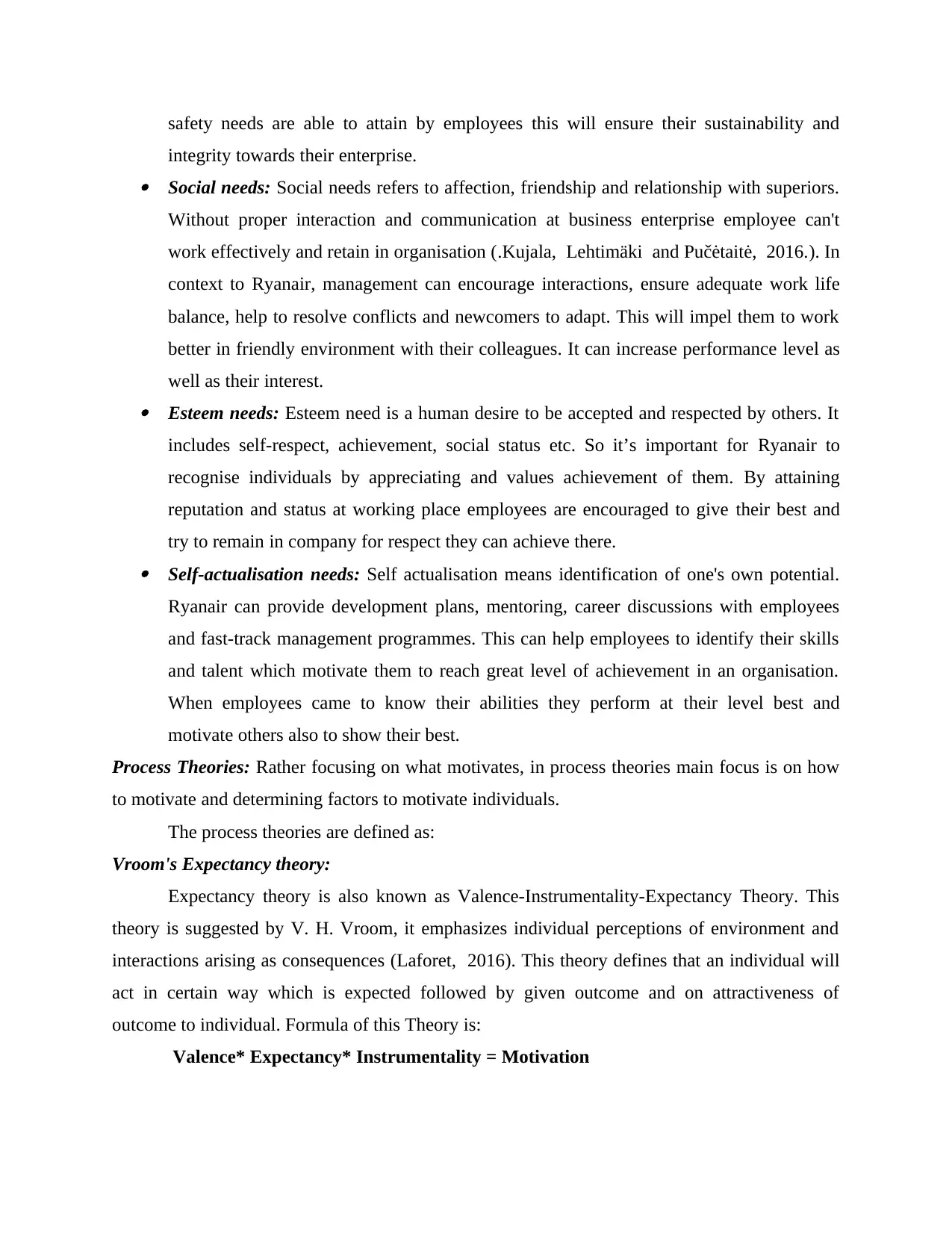
safety needs are able to attain by employees this will ensure their sustainability and
integrity towards their enterprise. Social needs: Social needs refers to affection, friendship and relationship with superiors.
Without proper interaction and communication at business enterprise employee can't
work effectively and retain in organisation (.Kujala, Lehtimäki and Pučėtaitė, 2016.). In
context to Ryanair, management can encourage interactions, ensure adequate work life
balance, help to resolve conflicts and newcomers to adapt. This will impel them to work
better in friendly environment with their colleagues. It can increase performance level as
well as their interest. Esteem needs: Esteem need is a human desire to be accepted and respected by others. It
includes self-respect, achievement, social status etc. So it’s important for Ryanair to
recognise individuals by appreciating and values achievement of them. By attaining
reputation and status at working place employees are encouraged to give their best and
try to remain in company for respect they can achieve there. Self-actualisation needs: Self actualisation means identification of one's own potential.
Ryanair can provide development plans, mentoring, career discussions with employees
and fast-track management programmes. This can help employees to identify their skills
and talent which motivate them to reach great level of achievement in an organisation.
When employees came to know their abilities they perform at their level best and
motivate others also to show their best.
Process Theories: Rather focusing on what motivates, in process theories main focus is on how
to motivate and determining factors to motivate individuals.
The process theories are defined as:
Vroom's Expectancy theory:
Expectancy theory is also known as Valence-Instrumentality-Expectancy Theory. This
theory is suggested by V. H. Vroom, it emphasizes individual perceptions of environment and
interactions arising as consequences (Laforet, 2016). This theory defines that an individual will
act in certain way which is expected followed by given outcome and on attractiveness of
outcome to individual. Formula of this Theory is:
Valence* Expectancy* Instrumentality = Motivation
integrity towards their enterprise. Social needs: Social needs refers to affection, friendship and relationship with superiors.
Without proper interaction and communication at business enterprise employee can't
work effectively and retain in organisation (.Kujala, Lehtimäki and Pučėtaitė, 2016.). In
context to Ryanair, management can encourage interactions, ensure adequate work life
balance, help to resolve conflicts and newcomers to adapt. This will impel them to work
better in friendly environment with their colleagues. It can increase performance level as
well as their interest. Esteem needs: Esteem need is a human desire to be accepted and respected by others. It
includes self-respect, achievement, social status etc. So it’s important for Ryanair to
recognise individuals by appreciating and values achievement of them. By attaining
reputation and status at working place employees are encouraged to give their best and
try to remain in company for respect they can achieve there. Self-actualisation needs: Self actualisation means identification of one's own potential.
Ryanair can provide development plans, mentoring, career discussions with employees
and fast-track management programmes. This can help employees to identify their skills
and talent which motivate them to reach great level of achievement in an organisation.
When employees came to know their abilities they perform at their level best and
motivate others also to show their best.
Process Theories: Rather focusing on what motivates, in process theories main focus is on how
to motivate and determining factors to motivate individuals.
The process theories are defined as:
Vroom's Expectancy theory:
Expectancy theory is also known as Valence-Instrumentality-Expectancy Theory. This
theory is suggested by V. H. Vroom, it emphasizes individual perceptions of environment and
interactions arising as consequences (Laforet, 2016). This theory defines that an individual will
act in certain way which is expected followed by given outcome and on attractiveness of
outcome to individual. Formula of this Theory is:
Valence* Expectancy* Instrumentality = Motivation
Paraphrase This Document
Need a fresh take? Get an instant paraphrase of this document with our AI Paraphraser
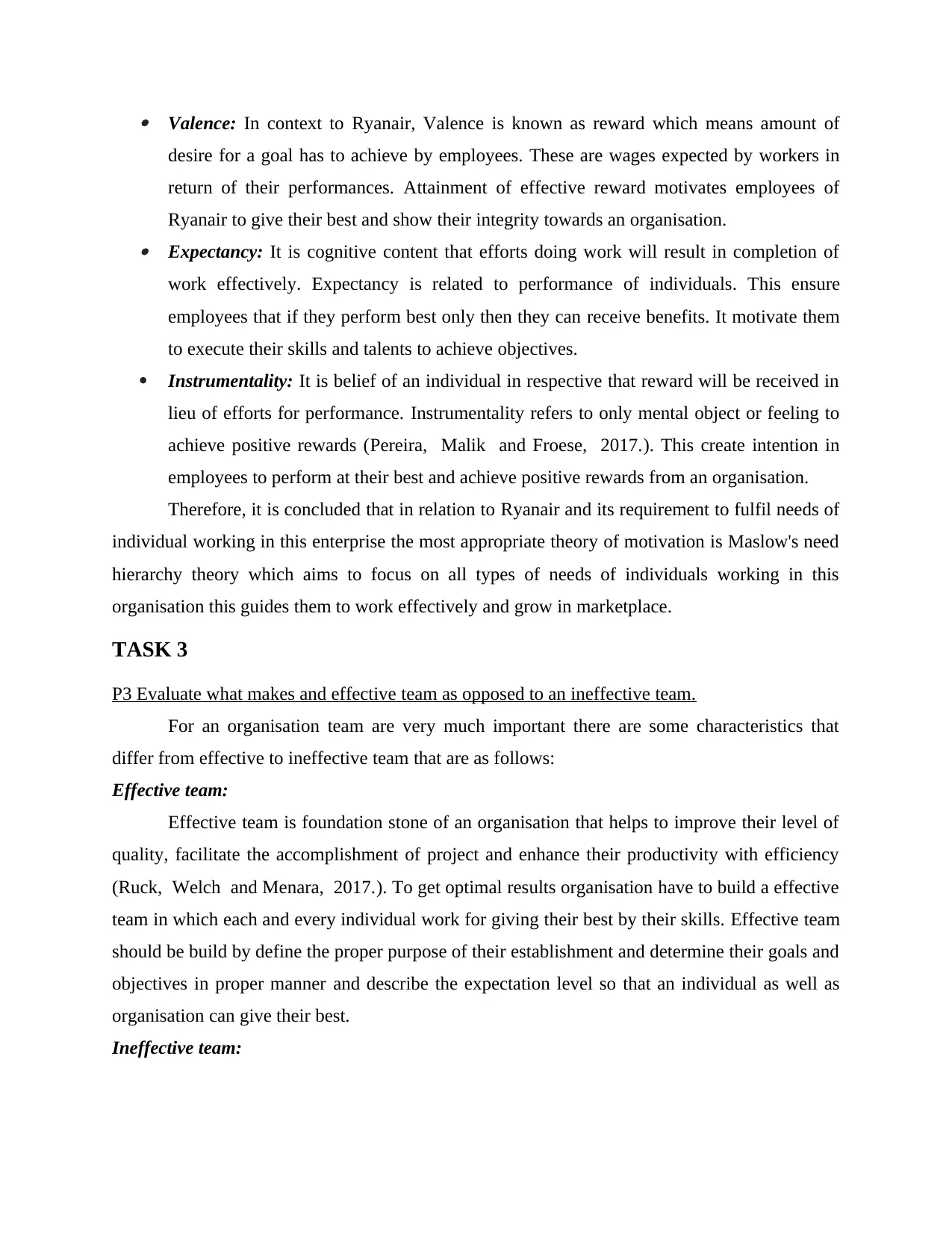
Valence: In context to Ryanair, Valence is known as reward which means amount of
desire for a goal has to achieve by employees. These are wages expected by workers in
return of their performances. Attainment of effective reward motivates employees of
Ryanair to give their best and show their integrity towards an organisation. Expectancy: It is cognitive content that efforts doing work will result in completion of
work effectively. Expectancy is related to performance of individuals. This ensure
employees that if they perform best only then they can receive benefits. It motivate them
to execute their skills and talents to achieve objectives.
Instrumentality: It is belief of an individual in respective that reward will be received in
lieu of efforts for performance. Instrumentality refers to only mental object or feeling to
achieve positive rewards (Pereira, Malik and Froese, 2017.). This create intention in
employees to perform at their best and achieve positive rewards from an organisation.
Therefore, it is concluded that in relation to Ryanair and its requirement to fulfil needs of
individual working in this enterprise the most appropriate theory of motivation is Maslow's need
hierarchy theory which aims to focus on all types of needs of individuals working in this
organisation this guides them to work effectively and grow in marketplace.
TASK 3
P3 Evaluate what makes and effective team as opposed to an ineffective team.
For an organisation team are very much important there are some characteristics that
differ from effective to ineffective team that are as follows:
Effective team:
Effective team is foundation stone of an organisation that helps to improve their level of
quality, facilitate the accomplishment of project and enhance their productivity with efficiency
(Ruck, Welch and Menara, 2017.). To get optimal results organisation have to build a effective
team in which each and every individual work for giving their best by their skills. Effective team
should be build by define the proper purpose of their establishment and determine their goals and
objectives in proper manner and describe the expectation level so that an individual as well as
organisation can give their best.
Ineffective team:
desire for a goal has to achieve by employees. These are wages expected by workers in
return of their performances. Attainment of effective reward motivates employees of
Ryanair to give their best and show their integrity towards an organisation. Expectancy: It is cognitive content that efforts doing work will result in completion of
work effectively. Expectancy is related to performance of individuals. This ensure
employees that if they perform best only then they can receive benefits. It motivate them
to execute their skills and talents to achieve objectives.
Instrumentality: It is belief of an individual in respective that reward will be received in
lieu of efforts for performance. Instrumentality refers to only mental object or feeling to
achieve positive rewards (Pereira, Malik and Froese, 2017.). This create intention in
employees to perform at their best and achieve positive rewards from an organisation.
Therefore, it is concluded that in relation to Ryanair and its requirement to fulfil needs of
individual working in this enterprise the most appropriate theory of motivation is Maslow's need
hierarchy theory which aims to focus on all types of needs of individuals working in this
organisation this guides them to work effectively and grow in marketplace.
TASK 3
P3 Evaluate what makes and effective team as opposed to an ineffective team.
For an organisation team are very much important there are some characteristics that
differ from effective to ineffective team that are as follows:
Effective team:
Effective team is foundation stone of an organisation that helps to improve their level of
quality, facilitate the accomplishment of project and enhance their productivity with efficiency
(Ruck, Welch and Menara, 2017.). To get optimal results organisation have to build a effective
team in which each and every individual work for giving their best by their skills. Effective team
should be build by define the proper purpose of their establishment and determine their goals and
objectives in proper manner and describe the expectation level so that an individual as well as
organisation can give their best.
Ineffective team:
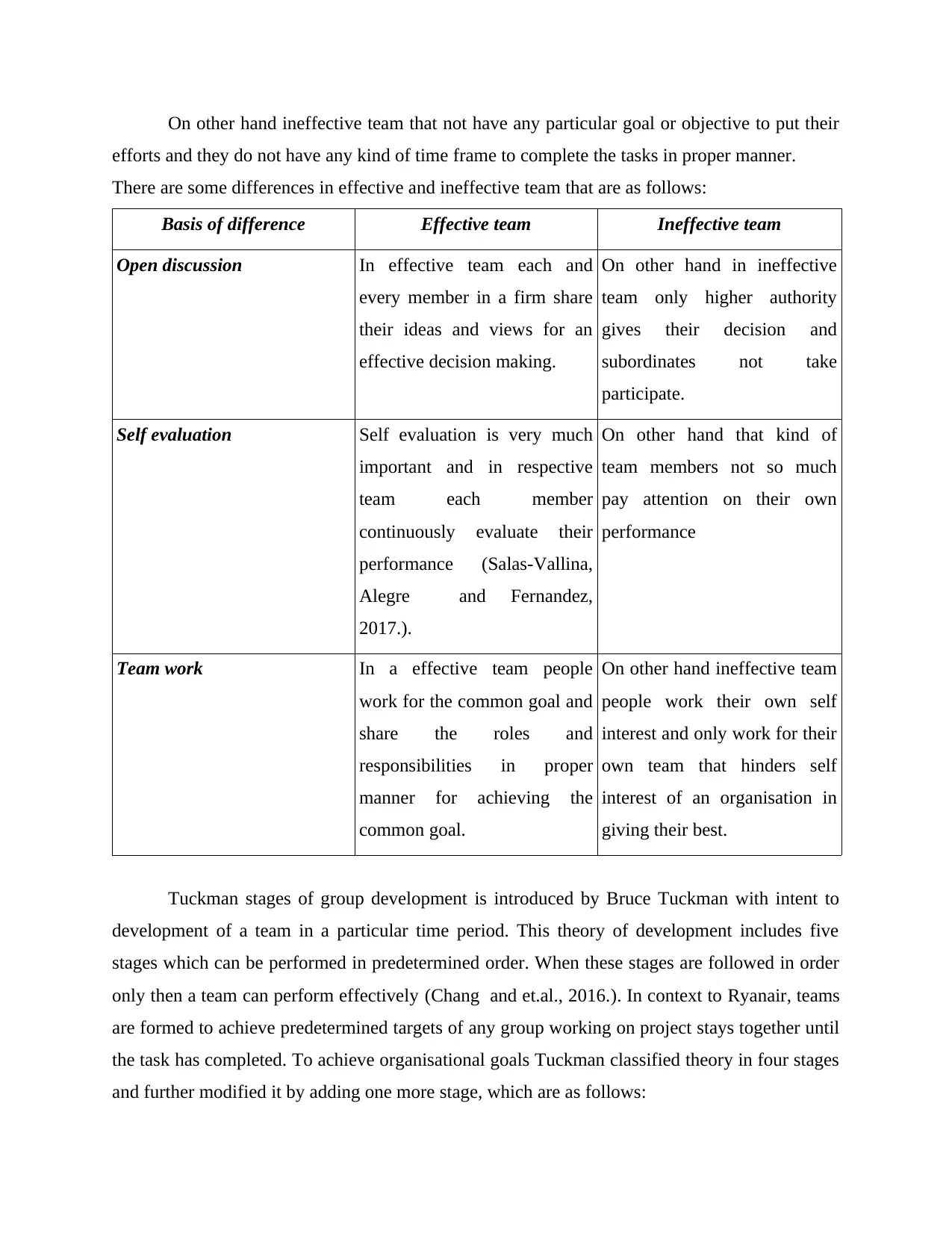
On other hand ineffective team that not have any particular goal or objective to put their
efforts and they do not have any kind of time frame to complete the tasks in proper manner.
There are some differences in effective and ineffective team that are as follows:
Basis of difference Effective team Ineffective team
Open discussion In effective team each and
every member in a firm share
their ideas and views for an
effective decision making.
On other hand in ineffective
team only higher authority
gives their decision and
subordinates not take
participate.
Self evaluation Self evaluation is very much
important and in respective
team each member
continuously evaluate their
performance (Salas-Vallina,
Alegre and Fernandez,
2017.).
On other hand that kind of
team members not so much
pay attention on their own
performance
Team work In a effective team people
work for the common goal and
share the roles and
responsibilities in proper
manner for achieving the
common goal.
On other hand ineffective team
people work their own self
interest and only work for their
own team that hinders self
interest of an organisation in
giving their best.
Tuckman stages of group development is introduced by Bruce Tuckman with intent to
development of a team in a particular time period. This theory of development includes five
stages which can be performed in predetermined order. When these stages are followed in order
only then a team can perform effectively (Chang and et.al., 2016.). In context to Ryanair, teams
are formed to achieve predetermined targets of any group working on project stays together until
the task has completed. To achieve organisational goals Tuckman classified theory in four stages
and further modified it by adding one more stage, which are as follows:
efforts and they do not have any kind of time frame to complete the tasks in proper manner.
There are some differences in effective and ineffective team that are as follows:
Basis of difference Effective team Ineffective team
Open discussion In effective team each and
every member in a firm share
their ideas and views for an
effective decision making.
On other hand in ineffective
team only higher authority
gives their decision and
subordinates not take
participate.
Self evaluation Self evaluation is very much
important and in respective
team each member
continuously evaluate their
performance (Salas-Vallina,
Alegre and Fernandez,
2017.).
On other hand that kind of
team members not so much
pay attention on their own
performance
Team work In a effective team people
work for the common goal and
share the roles and
responsibilities in proper
manner for achieving the
common goal.
On other hand ineffective team
people work their own self
interest and only work for their
own team that hinders self
interest of an organisation in
giving their best.
Tuckman stages of group development is introduced by Bruce Tuckman with intent to
development of a team in a particular time period. This theory of development includes five
stages which can be performed in predetermined order. When these stages are followed in order
only then a team can perform effectively (Chang and et.al., 2016.). In context to Ryanair, teams
are formed to achieve predetermined targets of any group working on project stays together until
the task has completed. To achieve organisational goals Tuckman classified theory in four stages
and further modified it by adding one more stage, which are as follows:
⊘ This is a preview!⊘
Do you want full access?
Subscribe today to unlock all pages.

Trusted by 1+ million students worldwide
1 out of 17
Related Documents
Your All-in-One AI-Powered Toolkit for Academic Success.
+13062052269
info@desklib.com
Available 24*7 on WhatsApp / Email
![[object Object]](/_next/static/media/star-bottom.7253800d.svg)
Unlock your academic potential
Copyright © 2020–2026 A2Z Services. All Rights Reserved. Developed and managed by ZUCOL.



